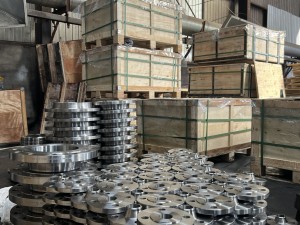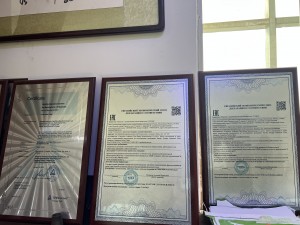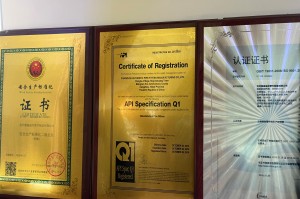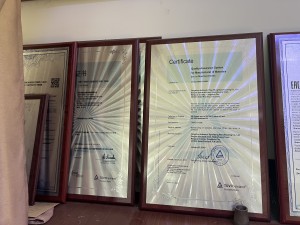Orifice Flange
details
|
Manufacturing Standards: |
ASME/ANSI B16.9, ASME B16.28, MSS-SP-43, GB/T12459, GB/T13401, SH3408, SH3409, JIS B2311/2220, DIN2617/2616/2615 |
|
Size: |
1/2〞(DN15)to 60〞(DN1500) |
|
Pressure: |
150LBS,300LBS,400LBS,600LBS,900LBS,1500LBS,2500LBS. DIN Standard PN-2.5,6,10,16,25,40,50,64,110,150,250,320,400. |
|
OD: |
3/8”—40” |
|
Material: |
CS A105/SA105N,SS 304/3034L,316/316L |
|
Surface: |
RF,MFM,TG,RJ,RF |
|
Carbon Steel |
ASTM A694 F42, F46, F48, F50, F52, F56, F60, F65, F70 |
|
Surface Treatment: |
Antirust Paint,Oil Black Paint,Yellow Transparent,Zinc Plated,Cold and Hot Dip Galvanized |
|
Material Grades |
|
|
Carbon Steel |
ASTM A105/A105N, A350 LF1, LF2 CL1/CL2, LF3 CL1/CL2, A694 F42, F46, F48, F50, F52, F56, F60, F65, F70, A516.60, 65, 70 (Spectacle Blind Flange, Spacer Ring/Spade Flange), Steel RST37.2, C22.8 |
|
Stainless Steel |
ASTM A182 F202, F304/304L/304H, F316/316L, F316H, F316TI, F310, F321, F904L |
|
Duplex & Super Duplex Steel |
ASTM / ASME A/SA 182 F44, F45, F51, F53, F55, F60, F61, 2205 (UNS No. S31803), 2507 (UNS No.S32750),1.4462,1.4410,1.4547 |
|
Alloy Steel |
ASTM A182 F1, F5, F9, F11, F22, F91 |
|
Copper Alloy Steel |
UNS No. C10100, 10200, 10300, 10800, 12000, 12200, 70600, 71500, UNS No. C70600 (Cu -Ni- 90/10), C71500 (Cu -Ni- 70/30) |
|
Nickel Alloy |
Nickel 200 (UNS No. N02200), Nickel 201 (UNS No. N02201), Monel 400 (UNS No. N04400), Monel 500 (UNS No. N05500) Inconel 800 (UNS No. N08800), Inconel 825 (UNS No. N08825), Inconel 600 (UNS No. N06600), Inconel 625 (UNS No. N06625) Inconel 601 (UNS No. N06601), Hastelloy C 276 (UNS No. N10276), Alloy 20 (UNS No. N08020), Titanium (Grade I & II). |

details

USE &APPLICATION
- Commonly used in the following industries:
- architecture

- bridge
- Petrochemical industry
- shipbuilding
- project
- Offshore and onshore services
- Power generation industry
- Food processing industry
- oil and gas industry
- sugar industry
 Package
Package
Products are packaged to ensure that there is no damage during transit.
In case of exports, standard export packaging is done in wooden cases.
All pipes are marked with Grade, Lot No, Size, Degree and our trade mark.
On special requests we can also, make custom marking on our products.
Wooden Boxes
Wooden Pallets
Shrink-Wrapped
Carton Boxes
Wooden Boxes
Testing
Manufacturer Test Certificate as per EN 10204 / 3.1B, Raw Materials Certificate, 100% Radiography Test Report, Third Party Inspection Report
Positive Material Identification - PMI Testing
Chemical Analysis - Spectro Analysis
Mechanical Testing Such as Tensile, Elongation, Reduction of Area
Micro Test
Macro Test
Hardness Test
Pitting Resistance Test
Intergranular Corrosion (IGC) Test
Flaring Test
Flattening Test
Hydrostatic Test
Hydrogen-Induced Cracking (HIC) Test, NACE TM0284
Sulfide Stress Corrosion Cracking (SSC), NACE TM 0177
Radiography Test
Dye Penetrant Test (DP Test)
Certification
 All materials are strictly inspected at every stage of the production process from procurement
to product shipment. Visually inspect them for compliance with ASTM, ASME, MSS, DIN,
EN and JIS codes and standards. Support officially certified inspection agencies to witness product
All materials are strictly inspected at every stage of the production process from procurement
to product shipment. Visually inspect them for compliance with ASTM, ASME, MSS, DIN,
EN and JIS codes and standards. Support officially certified inspection agencies to witness product

 material reporting,
dimensional and quality compliance.
Factory inspections are also supported.
material reporting,
dimensional and quality compliance.
Factory inspections are also supported.Product Description
An Orifice Flange is used in combination with orifice meters to measure the flow rate of oil, gas and other liquids conveyed by the pipeline. Orifice flanges are manufactured to ASME B16.36 in multiple sizes and, material grades.
WHAT IS AN ORIFICE FLANGE?
An orifice flange is used to measure the flow of the fluid conveyed by the pipeline via a flow nozzle positioned on the flange itself. Pairs of pressure tappings are machined onto the orifice flange, making separate tappings on the pipe wall unnecessary.
The traditional orifice flange assembly consists of a pair of flanges, orifice plate, bolts, nuts, gaskets, jacking screws and plugs. Jacking screws ensure the easy removal of the primary flow element.

Working principle of orifice plate flange
The working principle of the orifice plate flange is to achieve flow measurement based on the shape and arrangement of the holes on the orifice plate. When the fluid passes through the orifice plate, the shape and arrangement of the holes will cause the fluid flow to be blocked, thereby forming a pressure difference. The differential pressure sensor is used to measure the size of this pressure difference, and the fluid flow rate is calculated according to the corresponding formula. Orifice plate flanges have the advantages of simple structure, easy use, and high measurement accuracy. They are widely used in industrial fields such as petroleum, chemical industry, thermal power, and water conservancy.
Application of orifice plate flange in industrial production
Orifice plate flanges are widely used in industrial production, mainly including the following aspects:
Flow measurement and metering. Orifice plate flanges can be used for the measurement and metering of liquids, gases, steam and other fluids. They have the advantages of wide measurement range, high accuracy and easy use.
Flow control. The orifice plate flange can control and adjust the flow rate by adjusting the hole shape and arrangement of the orifice plate, so that the flow rate reaches the predetermined target value and meets the production requirements.
Fluid handling and pipeline optimization. Orifice flanges can measure the flow in different pipelines, analyze the distribution and change patterns of fluids, optimize the pipeline structure and fluid treatment system, and improve production efficiency and quality.
To sum up, the orifice plate flange is an important flow measurement device and plays an important role in industrial production and fluid treatment processes.
Advantage
















